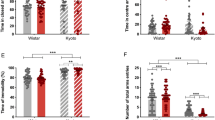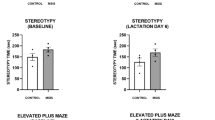Abstract
Rationale
Early-life experience has long-term consequences on affective behavior and drug abuse in adults. While many manipulations used to study these consequences alter mother–infant interactions, the effects of sibling interactions are less well characterized.
Objectives
To examine the long-term effects of early postnatal sibling deprivation (EPSD) on anxiety-like behavior, sucrose preference and behavioral responses to cocaine in adult rats.
Materials and methods
After EPSD manipulation, in which litters were culled to one pup on postnatal day 1 (PN1) or 7 (PN7), the dams’ maternal behavior was observed. After the pups reached adulthood, we tested their behavioral responses in the elevated plus maze and sucrose consumption, and to cocaine conditioned place preference and cocaine sensitization.
Results
The pups with EPSD on PN1 received more maternal licking/grooming during the first postnatal week. EPSD on PN1 but not PN7 enhanced locomotor activity in the open field test and exploration of open arms in the elevated plus maze in both female and male offspring. While EPSD had no effect on sucrose intake in adult rats, it decreased vulnerability to cocaine sensitization and cocaine conditioned place preference in male but not female rats.
Conclusion
Our findings that early postnatal sibling deprivation influences maternal licking/grooming behavior, as well as anxiety-like behavior and vulnerability to drugs in pups that have grown to adulthood, suggests that both sibling interaction and maternal behavior, play critical roles in individual development.






Similar content being viewed by others
References
Anisman H, Zaharia MD, Meaney MJ, Merali Z (1998) Do early-life events permanently alter behavioral and hormonal responses to stressors? Int J Dev Neurosci 16:149–164
Bennett JC, McRae PA, Levy LJ, Frick KM (2006) Long-term continuous, but not daily, environmental enrichment reduces spatial memory decline in aged male mice. Neurobiol Learn Mem 85:139–152
Boccia ML, Pedersen CA (2001) Brief vs. long maternal separations in infancy: contrasting relationships with adult maternal behavior and lactation levels of aggression and anxiety. Psychoneuroendocrinology 26:657–672
Borowsky B, Kuhn CM (1991) Chronic cocaine administration sensitizes behavioral but not neuroendocrine responses. Brain Res 543:301–306
Boudreau AC, Wolf ME (2005) Behavioral sensitization to cocaine is associated with increased AMPA receptor surface expression in the nucleus accumbens. J Neurosci 25:9144–9151
Bredy TW, Lee AW, Meaney MJ, Brown RE (2004) Effect of neonatal handling and paternal care on offspring cognitive development in the monogamous California mouse (Peromyscus californicus). Horm Behav 46:30–38
Caldji C, Tannenbaum B, Sharma S, Francis D, Plotsky PM, Meaney MJ (1998) Maternal care during infancy regulates the development of neural systems mediating the expression of fearfulness in the rat. Proc Natl Acad Sci U S A 95:5335–5340
Choi S, DiSilvio B, Unangst J, Fernstrom JD (2007) Effect of chronic infusion of olanzapine and clozapine on food intake and body weight gain in male and female rats. Life Sci 81:1024–1030
Cukor D, McGinn LK (2006) History of child abuse and severity of adult depression: the mediating role of cognitive schema. J Child Sex Abus 15:19–34
Dackis CA, Kampman KM, Lynch KG, Pettinati HM, O'Brien CP (2005) A double-blind, placebo-controlled trial of modafinil for cocaine dependence. Neuropsychopharmacology 30:205–211
Durand M, Sarrieau A, Aguerre S, Mormede P, Chaouloff F (1998) Differential effects of neonatal handling on anxiety, corticosterone response to stress, and hippocampal glucocorticoid and serotonin (5-HT)2A receptors in Lewis rats. Psychoneuroendocrinology 23:323–335
Eklund MB, Arborelius L (2006) Twice daily long maternal separations in Wistar rats decreases anxiety-like behaviour in females but does not affect males. Behav Brain Res 172:278–285
Henniger MS, Spanagel R, Wigger A, Landgraf R, Holter SM (2002) Alcohol self-administration in two rat lines selectively bred for extremes in anxiety-related behavior. Neuropsychopharmacology 26:729–736
Howe MG, Madgett ME (1975) Mental health problems associated with the only child. Can Psychiatr Assoc J 20:189–194
Huot RL, Plotsky PM, Lenox RH, McNamara RK (2002) Neonatal maternal separation reduces hippocampal mossy fiber density in adult Long Evans rats. Brain Res 950:52–63
Jaworski JN, Francis DD, Brommer CL, Morgan ET, Kuhar MJ (2005) Effects of early maternal separation on ethanol intake, GABA receptors and metabolizing enzymes in adult rats. Psychopharmacology (Berl) 181:8–15
Kelly JP, Leonard BE (1999) An investigation of the antidepressant properties of lofepramine and its desmethylated metabolites in the forced swim and olfactory bulbectomized rat models of depression. Eur Neuropsychopharmacol 9:101–105
Kemppainen L, Jokelainen J, Jarvelin MR, Isohanni M, Rasanen P (2001) The one-child family and violent criminality: a 31-year follow-up study of the Northern Finland 1966 Birth Cohort. Am J Psychiatry 158:960–962
Kosten TA, Miserendino MJ, Kehoe P (2000) Enhanced acquisition of cocaine self-administration in adult rats with neonatal isolation stress experience. Brain Res 875:44–50
Kosten TA, Sanchez H, Zhang XY, Kehoe P (2004) Neonatal isolation enhances acquisition of cocaine self-administration and food responding in female rats. Behav Brain Res 151:137–149
Kosten T, Kosten T, Poling J, Oliveto A (2005) “Incubation” of cocaine relapse during a disulfiram clinical trial. CPDD. Annual Meeting Abstracts, p 90
Kosten TA, Zhang XY, Kehoe P (2006) Heightened cocaine and food self-administration in female rats with neonatal isolation experience. Neuropsychopharmacology 31:70–76
Laviola G, Dell'Omo G, Alleva E, Bignami G (1992) Ontogeny of cocaine hyperactivity and conditioned place preference in mice. Psychopharmacology (Berl) 107:221–228
Lehmann J, Stohr T, Feldon J (2000) Long-term effects of prenatal stress experiences and postnatal maternal separation on emotionality and attentional processes. Behav Brain Res 107:133–144
Li Y, Robinson TE, Bhatnagar S (2003) Effects of maternal separation on behavioural sensitization produced by repeated cocaine administration in adulthood. Brain Res 960:42–47
Li YQ, Wang XY, Zhai HF, Zhang XY, Kosten T, Lu L (2008) Sex- and age-dependent effects of early postnatal sibling deprivation on spatial learning and memory in adult rats. Behav Brain Res 186:138–142
Liu D, Diorio J, Day JC, Francis DD, Meaney MJ (2000) Maternal care, hippocampal synaptogenesis and cognitive development in rats. Nat Neurosci 3:799–806
Lu L, Ceng X, Huang M (2000) Corticotropin-releasing factor receptor type I mediates stress-induced relapse to opiate dependence in rats. Neuroreport 11:2373–2378
Lu L, Liu Z, Huang M, Zhang Z (2003) Dopamine-dependent responses to cocaine depend on corticotropin-releasing factor receptor subtypes. J Neurochem 84:1378–1386
Macri S, Mason GJ, Wurbel H (2004) Dissociation in the effects of neonatal maternal separations on maternal care and the offspring's HPA and fear responses in rats. Eur J Neurosci 20:1017–1024
Maldonado AM, Kirstein CL (2005) Handling alters cocaine-induced activity in adolescent but not adult male rats. Physiol Behav 84:321–326
Matthews K, Robbins TW, Everitt BJ, Caine SB (1999) Repeated neonatal maternal separation alters intravenous cocaine self-administration in adult rats. Psychopharmacology (Berl) 141:123–134
McEwen BS (2003) Early life influences on life-long patterns of behavior and health. Ment Retard Dev Disabil Res Rev 9:149–154
Meaney MJ, Szyf M (2005) Maternal care as a model for experience-dependent chromatin plasticity? Trends Neurosci 28:456–463
Meaney MJ, Aitken DH, van Berkel C, Bhatnagar S, Sapolsky RM (1988) Effect of neonatal handling on age-related impairments associated with the hippocampus. Science 239:766–768
Meaney MJ, Aitken DH, Bhatnagar S, Sapolsky RM (1991) Postnatal handling attenuates certain neuroendocrine, anatomical, and cognitive dysfunctions associated with aging in female rats. Neurobiol Aging 12:31–38
Melo AI, Lovic V, Gonzalez A, Madden M, Sinopoli K, Fleming AS (2006) Maternal and littermate deprivation disrupts maternal behavior and social-learning of food preference in adulthood: tactile stimulation, nest odor, and social rearing prevent these effects. Dev Psychobiol 48:209–219
Merali Z, McIntosh J, Kent P, Michaud D, Anisman H (1998) Aversive and appetitive events evoke the release of corticotropin-releasing hormone and bombesin-like peptides at the central nucleus of the amygdala. J Neurosci 18:4758–4766
Moffett MC, Harley J, Francis D, Sanghani SP, Davis WI, Kuhar MJ (2006) Maternal separation and handling affects cocaine self-administration in both the treated pups as adults and the dams. J Pharmacol Exp Ther 317:1210–1218
Oitzl MS, Workel JO, Fluttert M, Frosch F, De Kloet ER (2000) Maternal deprivation affects behaviour from youth to senescence: amplification of individual differences in spatial learning and memory in senescent Brown Norway rats. Eur J Neurosci 12:3771–3780
Penke Z, Felszeghy K, Fernette B, Sage D, Nyakas C, Burlet A (2001) Postnatal maternal deprivation produces long-lasting modifications of the stress response, feeding and stress-related behaviour in the rat. Eur J Neurosci 14:747–755
Renard GM, Suarez MM, Levin GM, Rivarola MA (2005) Sex differences in rats: effects of chronic stress on sympathetic system and anxiety. Physiol Behav 85:363–369
Richardson NR, Roberts DC (1996) Progressive ratio schedules in drug self-administration studies in rats: a method to evaluate reinforcing efficacy. J Neurosci Methods 66:1–11
Romeo RD, Mueller A, Sisti HM, Ogawa S, McEwen BS, Brake WG (2003) Anxiety and fear behaviors in adult male and female C57BL/6 mice are modulated by maternal separation. Horm Behav 43:561–567
Sinha R, Kimmerling A, Doebrick C, Kosten TR (2007) Effects of lofexidine on stress-induced and cue-induced opioid craving and opioid abstinence rates: preliminary findings. Psychopharmacology (Berl) 190:569–574
Slotten HA, Kalinichev M, Hagan JJ, Marsden CA, Fone KC (2006) Long-lasting changes in behavioural and neuroendocrine indices in the rat following neonatal maternal separation: gender-dependent effects. Brain Res 1097:123–132
Sobrian SK, Marr L, Ressman K (2003) Prenatal cocaine and/or nicotine exposure produces depression and anxiety in aging rats. Prog Neuropsychopharmacol Biol Psychiatry 27:501–518
Tseng WS, Kuotai T, Hsu J, Chiu JH, Yu L, Kameoka V (1988) Family planning and child mental health in China: the Nanjing Survey. Am J Psychiatry 145:1396–1403
Walker MP, Brakefield T, Hobson JA, Stickgold R (2003) Dissociable stages of human memory consolidation and reconsolidation. Nature 425:616–620
Wang J, Fang Q, Liu Z, Lu L (2006) Region-specific effects of brain corticotropin-releasing factor receptor type 1 blockade on footshock-stress- or drug-priming-induced reinstatement of morphine conditioned place preference in rats. Psychopharmacology (Berl) 185:19–28
Weaver IC, Cervoni N, Champagne FA, D'Alessio AC, Sharma S, Seckl JR, Dymov S, Szyf M, Meaney MJ (2004) Epigenetic programming by maternal behavior. Nat Neurosci 7:847–854
Wigger A, Neumann ID (1999) Periodic maternal deprivation induces gender-dependent alterations in behavioral and neuroendocrine responses to emotional stress in adult rats. Physiol Behav 66:293–302
Zhang XY, Sanchez H, Kehoe P, Kosten TA (2005) Neonatal isolation enhances maintenance but not reinstatement of cocaine self-administration in adult male rats. Psychopharmacology (Berl) 177:391–399
Acknowledgments
This work was supported in part by the National Basic Research Program of China (No: 2007CB512302 and 2003CB 515400), the National High Technology Research and Development Program of China (863 Program, 2006AA02Z4D1) and the Natural Science Foundation of China (No: 30570576, 30670713 and 30725016).
Author information
Authors and Affiliations
Corresponding author
Rights and permissions
About this article
Cite this article
Li, YQ., Wang, XY., Zhai, Hf. et al. Effects of early postnatal sibling deprivation on anxiety and vulnerability to cocaine in offspring rats. Psychopharmacology 199, 245–253 (2008). https://doi.org/10.1007/s00213-008-1169-9
Received:
Accepted:
Published:
Issue Date:
DOI: https://doi.org/10.1007/s00213-008-1169-9




